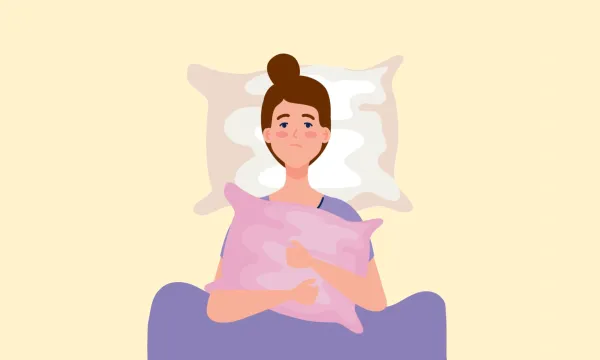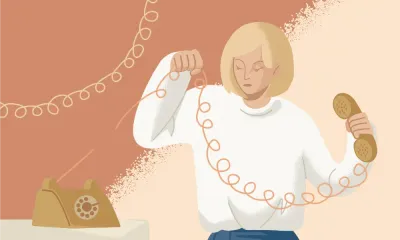You could be doing something as mundane as folding your laundry when all too familiar thoughts ambush you. You think of their smile and the first time you kissed. You replay every beautiful moment and get lost in how it felt to be loved.
Then, things get dark. You start to obsess over why they felt the need to leave your heart in tatters. You ask yourself how someone who promised to be in it for the long haul could abandon you so easily.
Before you know it, you’ve spiraled down a rabbit hole that will take days to crawl out of. Getting over an ex is complicated. While studies have it pegged at 11 weeks, there really is no timeline for getting over someone.
Things to know
- Getting over an ex can be complicated and there is no set timeline for when you will be over them. Be patient and kind to yourself.
- It is important to accept and process your feelings, but also to let go of the past relationship and stop romanticizing your ex.
- Reclaiming your independence, getting rid of triggers such as photos or gifts and focusing on your other meaningful relationships can help you move on.
You can finally embark on the liberating journey of falling out of love with your ex. Here are 16 ways to do just that:
- Accept Your Feelings
- Let Go
- Stop Romanticizing Your Ex
- Process Your Emotions
- Reclaim Your Independence
- Get Rid Of Triggers
- Make A Clean Break
- Don’t Be Friends
- Get Off Social Media
- Reconnect With Who You Are
- Take Care Of Yourself
- Practice Self-Compassion
- Reconnect With Friends And Family
- Get Social
- Start Dating Again
- Focus On Your Current Relationship
- Get Professional Help
Accept Your Feelings
Don't be ashamed of the intensity of your feelings. You poured months or even years into loving your ex and invested time and emotional energy into your relationship.
Your ex might have been your high school sweetheart or your first love. You may have even believed they were your soul mate, so it's only natural to feel an overwhelming sense of loss.

For a long time, your ex was a major part of your life and you shared many memorable moments together. When your relationship ended, you lost a primary attachment figure. In addition to feeling abandoned and unsafe, you experienced intense emotional pain. Such strong feelings take time to process.
It doesn’t help that your body may be working against you. A breakup causes a drop in the ‘feel-good’ hormones, dopamine and serotonin. This leads to feelings of withdrawal and intense cravings to be reunited with your ex. Even after a couple of months, your brain could still be stuck in an acute state of longing.
Let Go
We invest a lot into romantic relationships, so when they break down, it’s devastating. We can start to think that we’ve lost our shot at true love or that our future relationships are doomed.
Your ex may represent the love you’ve always wanted, making letting go of them that much harder. Stop ruminating, blaming yourself, or feeling guilty. This negative feedback loop will only wreak havoc on your mental and physical health. You'll need to stop wondering "will he come back?"
You thought your ex was the one, and you can’t see yourself loving anyone as much as you loved them. However, you can love again, and you can meet someone who can love you the way you need to be loved.
You’re never going to meet that special person or be able to let them into your heart if you’re still holding on to the idea of getting your ex back. By refusing to let go, you're clinging to what could've been. Instead, embrace the future and all that it could be.

Stop Romanticizing Your Ex
Over time we tend to forget the painful memories associated with a past relationship. We forget about an ex’s negative traits and obsess over the good parts of the relationship.
You mustn't wonder "does he still love me?," as the relationship broke down for several reasons. Although you can't seem to remember some of them now, they were valid at the time.
Sadly, the image you have of your ex isn’t based on reality. An unintentional side effect of heartbreak is that you can start to see your ex through rose-tinted glasses. Reflect on the pitfalls of your relationship and try to be realistic about the part your ex played in the breakup.
Process Your Emotions
It may seem easier to deny or suppress your emotions, but that only prolongs your suffering. Similarly, dwelling on your emotions can be debilitating. You’ve got to process your emotions and find healthy ways of releasing them.
Try journaling, walking, or exercising. The key is to find what works for you. If you’re having a difficult time processing your emotions, confide in a close friend or family member. If you’d rather pour your heart out to a stranger, see a mental health professional.
Reclaim Your Independence
To reclaim your independence, you’ve got to acknowledge your feelings and work on addressing them.

This can be as simple as stepping back and observing them with kindness and understanding. You might say to yourself “I see that you’re feeling an intense longing to be with your ex” or “ I see that you’re feeling abandoned and rejected.”
As you sort through your feelings, use them to identify your underlying needs. Feelings of rejection usually point to a need to feel accepted. Intense longing reflects a need to feel love and comfort.
Give yourself time to process what you feel and what your needs are. In the past, you may have relied on your ex to meet your needs, but now you’ve got to work on the sustainable and self-loving practice of addressing them yourself.
If you need reassurance, think of ways to reassure yourself. If you need to feel loved, think of ways you can show yourself love.
Get Rid Of Triggers
For your feelings to fade, you’ve got to get rid of all the physical reminders of your ex. As painful as it may be, put away photos, gifts, or anything else that tends to trigger a stroll down memory lane.
Holding on to these things only keeps you trapped in grief and agony. By getting rid of them, you’re taking a physical step towards finally letting your ex go.
Make A Clean Break
Don't contact your ex and avoid seeing them. Ignore their late-night texts and refuse to take their calls. Lean into the power of silence instead. You might need to delete their number to resist contacting them or mistakenly sending a drunken text message.
Change your schedule or start going to different places to avoid bumping into them. If you're having a hard time moving on, experts recommend making major changes to your immediate environment. Consider this the perfect time to do a bit of redecorating.

Don’t Be Friends
While it’s tempting to think you can remain friends with your ex, doing so too soon after a breakup will leave your attachment bond intact, slow down your healing, and prevent you from moving on.
Let any lingering feelings fade before entertaining the possibility of a platonic relationship with them. If being friends was your ex’s idea, it’s time to put yourself first, establish clear boundaries, and walk away from the situation.

Perhaps you’re co-parenting and being friends seems like the best thing to do for your kids. By brushing the pain of the separation aside and pretending things are still the same between you, (save for the new living arrangements) you’re encouraging an unhealthy attachment to your ex.
Because you can’t just stop interacting with your ex, you've got to establish boundaries. Try to limit the timing and frequency of your interactions. While it’s important to keep your interactions polite, discourage any communication outside of making plans or carrying out your parental responsibilities.
Get Off Social Media
Resist the urge to stalk your ex on social media. Block them if you must. Every time you give in to the impulse to spy on them, you’re making it that much harder to stop thinking about them.
There’s also the very real danger of coming across potentially hurtful posts. For example, seeing that your ex has a new partner could trigger jealousy. You might see snippets of their new life and spiral into depression.
Even if your ex isn’t in a new relationship, keeping tabs on them will negatively affect your mental health. When you see them happily carrying on with life while you’re grieving what you believed was real love, your broken heart will slip back into intensive care.
Reconnect With Who You Are
It's easy to lose yourself in a relationship. This is why reconnecting with who you are is a necessary part of moving on. Focus on gaining a deeper understanding of who you are and what matters to you.
Consider all the activities you would really enjoy and select the most feasible options. Round up a few friends and make lasting memories. Better yet, go on a few solo adventures and discover new things about yourself.

Invest in a few self-help books and increase your self-awareness. What are your passions? What things could you work on to increase your sense of achievement? Challenge yourself to try out different things. It’s never too late to learn new skills or work on a project that's close to your heart.
Take Care Of Yourself
In the aftermath of a breakup, your daily routine is disrupted. It’s important to maintain healthy physical rhythms. Make sure you’re nourishing your body and getting enough sleep. To cope with negative feelings, work out.
Simply going for a walk is effective. Studies show that when you’re under stress, blood flows away from the left side of the brain where rational thinking takes place and flows to the right side of the brain.
Walking engages both sides of your brain, allowing you to start thinking rationally. You’re more likely to ditch the irrational doom-and-gloom thinking and once those feel-good hormones kick in, you’ll feel better.
Practice Self-Compassion
Rejection can leave you doubting if you're worthy of love. By practicing self-compassion, you can speed up the recovery process.
Self-compassion involves treating yourself with kindness rather than punishing yourself. It’s about rewiring your self-critical thoughts and replacing them with compassionate thoughts.

Any time you find yourself thinking about your ex, remind yourself how incredibly deserving of love and happiness you are. Fill your space with messages of compassion. With time, these constant reminders will help boost your self-esteem and encourage more positive thought patterns.
Reconnect With Friends And Family
As young children, our primary attachment figures are our parents. In adolescence, this shifts to our close friends. We rely on primary attachment figures for love, security, and acceptance.
In adulthood, our primary attachment bonds shift to our romantic partners. After a breakup, the loss of such a meaningful connection tends to disrupt our attachment systems.
To find the comfort and acceptance provided by our partners, we may attach to best friends or even family members. In the absence of close relationships to rely on, we run the risk of remaining deeply attached to our exes.
This is why it's crucial to reconnect with friends and family. Doing so will fill the human-sized void left by your ex. You’ll form deeper connections with family members or close friends and over time, you’ll detach from your ex.

Get Social
One of the best ways to distract yourself is to get out there and meet new people. You'd be surprised how flirting with a few gorgeous strangers can do wonders for your confidence.
Although you may not feel like it, you're still attractive and desirable. Accept a few invites or better yet, make it a weekly habit to paint the town red with friends. Being social is guaranteed to lift your spirits.
Start Dating Again
While it’s hard to picture yourself with someone new, research shows that dating again after a breakup can help you get over your ex faster.
Dating different people will give your self-confidence a boost. You’ll also get to experience all the wonderful feelings associated with falling in love again.
As you form new attachments, you’ll finally get to put the days of pining after your ex behind you. If the idea of a new relationship makes you anxious, keep things casual and give yourself time to heal.
Focus On Your Current Relationship

If you’re already in a committed relationship, accept that you have lingering feelings and work on resolving them. Still being in love with your ex doesn’t invalidate your feelings for your current girlfriend or boyfriend.
It certainly doesn’t have to spell disaster for your current relationship. Accept that you and your ex are now on different paths and focus on connecting with your current partner.
Don't fall into the trap of comparing your new love to an old flame. If you’re struggling to separate real life from fantasy, give your new relationship a fighting chance by seeing a relationship expert.
Get Professional Help
Breakups can alter our brain chemistry, making us more susceptible to anxiety, depression, and other mental health conditions.
It’s important to monitor your mental health. If your feelings are getting in the way of day-to-day tasks and making it difficult to focus on anything else, seek professional help.









